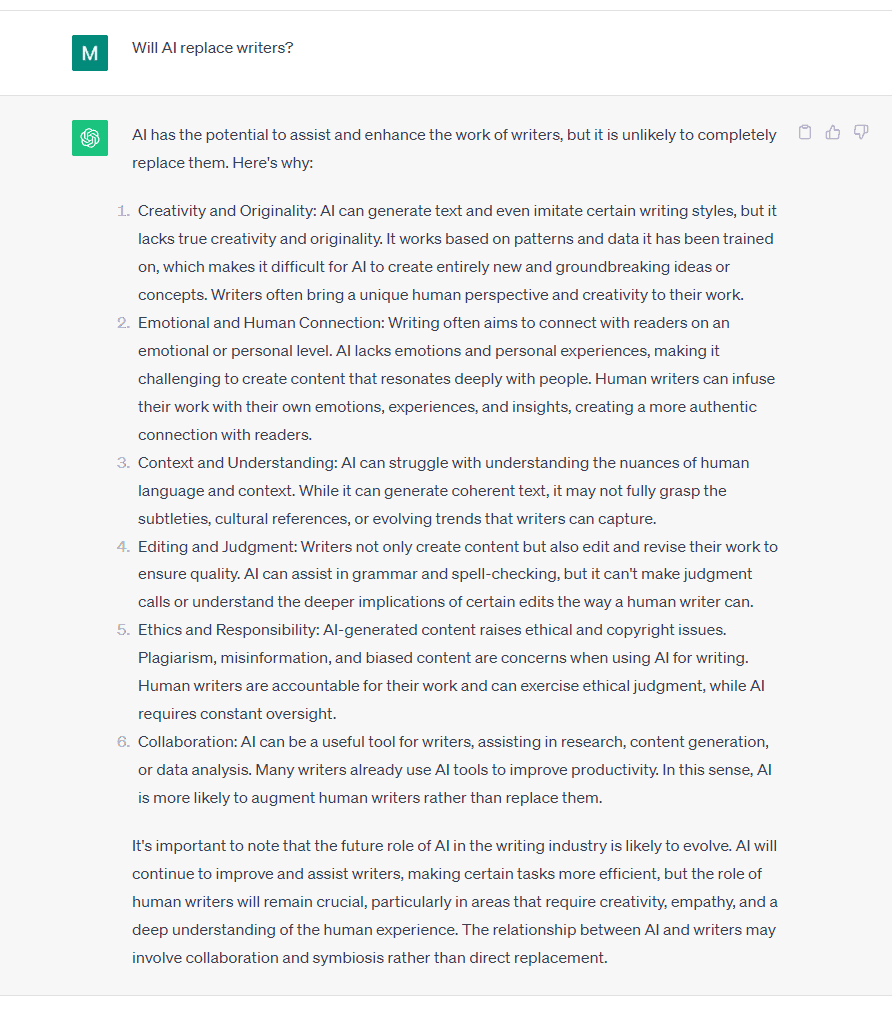Will AI Replace Writers? ChatGPT’s Response

Mike Stuzzi

AI has made significant advancements in recent years, especially when it comes to natural language processing. In other words, AI can understand human language and write like humans.
This technology has led to discussions in various areas, including writing. People have been asking “Will AI replace writers?” all over.
Some argue that AI will take the place of human writing at some point. Others note that AI will never write like a real person.
In this article, I’ll cover the topic of whether AI can replace writers in the future and what you can do about it. You’ll discover the advantages and disadvantages of AI vs human writing too.
So, let’s begin!
Benefits of AI in Writing
First, I’ll go through the benefits of AI writing tools.
1. Speed and Efficiency
One of the key advantages of AI in writing is its ability to generate content quickly and effectively. AI-powered writing tools can produce articles, blog posts, or even chapters for books in a fraction of the time it would take a human writer.
This productivity can be particularly beneficial for businesses or organizations that require large volumes of content on a regular basis. Instead of taking several hours or a day to write something, AI can do the work in minutes.
Writer’s block can be a thing of the past for you. AI can quickly give you ideas on new content, outlines or talking points, or the actual text.
2. Language and Grammar Assistance
AI-powered writing assistants come equipped with advanced language processing capabilities. They can identify and correct grammar and spelling errors, suggest alternative word choices and even provide feedback on sentence structure and readability.
This is something that advanced tools like Grammarly are known for. You already know how tiring it can be to try and find mistakes in your own writing.
Chances are that you’ll miss some (or many) of them either because you didn't notice them or you thought there was nothing to correct. In the past day, it would take a professional editor to help you proofread and edit large texts.
3. Translation
You no longer have to virtually travel to Spain or Japan to look for a proper translator for your texts. With the ability to process and understand multiple languages, AI can assist in translation tasks.
AI-powered translation tools can quickly and accurately translate text to ensure that your content can reach a wider audience and cater to different language preferences. You only have to write in one language, say English, and automatically convert your text to dozens of other languages.
Read also: How to Use AI for Writing
Limitations of AI in Writing
AI writers have limitations and I’ll list them below.
1. Lack of Creativity and Originality
AI-generated content lacks the unique perspective and creativity that writers bring to their work. What happens is that AI can generate content based on patterns and algorithms.
It lacks the ability to think abstractly and come up with original ideas. There are no new opinions that come from AI.
Writing often requires a creative spark and the ability to think outside the box. This is one aspect that AI struggles to replicate.
2. Cannot Replicate Emotions and Experiences
AI cannot infuse the emotions and experiences that writers do. Writing is an art form that allows writers to express their emotions, experiences, and personal insights.
AI, being a machine, does not possess emotions or personal experiences. Unlike human writers who have gone through life, an AI model for writing relies on the data it received during its training.
In other words, AI text can’t fully resonate with readers on an emotional level. It’s more of something for general information purposes.
3. Limited Adaptability to Changing Trends and Cultural Matters
Writing often reflects current trends, cultural references, and societal issues. AI may struggle to keep up with rapidly changing trends and cultural shifts.
Unless someone constantly feeds the model with new information, it would result in content that feels outdated or disconnected from the target audience.
For such reasons, AI can’t write about the most recent events. So, AI in news writing is something that we’re yet to see.
Why AI Can’t Replace Content Writers
I asked ChatGPT whether AI will replace writers. It gave me an interesting and comprehensive response that I’ll share below:

As you’ve seen, AI excels in various areas that humans can’t easily keep up. AI is faster, more efficient, and more accurate.
But again, human writing comes with specific and much-needed attributes that AI can’t copy. These include creativity, originality, experiences, emotions, and adaptability to recent changes.
Read also: How to Use ChatGPT for Blogging
How Writers Can Adapt in the AI Age
In this AI age, writers can adapt and continue to thrive by leveraging the capabilities of AI while focusing on their unique strengths. Here are some ways you can adapt as a writer:
1. Embrace AI as a Tool to Help
If you’re a writer, rather than viewing AI as a threat, it’s wiser to embrace it as a powerful tool in your writing process. AI can assist in tasks various tasks.
These include topic research, grammar and language assistance, and content generation. Utilizing AI tools can help you save time and boost the quality of your work.
2. Focus on the Uniqueness of Human Writing
While AI may excel at generating content fast, it lacks the ability to think creatively and bring a unique perspective to writing. The human touch is something that AI can’t replicate.
You as a writer need to emphasize your creativity, originality, storytelling (better than these AI tools for story writing), and ability to connect with readers on an emotional level. You have a lot of things that AI doesn’t!
You can talk about these aspects when trying to win clients. Any work with personal insights, experiences, and emotions beats AI-generated content.
3. Develop Niche Expertise
True to say, AI can create well-articulated content on a wide range of topics. The problem is that it often lacks the depth and expertise that human writers can offer.
You can focus on establishing niche expertise in specific industries or subjects to position yourself as a knowledgeable authority in your field. This expertise, combined with your unique writing style, can differentiate your work from AI-generated content.
Conclusion
AI cannot and will not entirely replace writers anytime soon. Even as more people opt to use AI for content, brands that value the uniqueness of human writers will always choose human-written work over AI text.
What you can do as a part-time, full-time, or hired writer is adapt by starting to use AI to automate various writing tasks. If you use AI to create text-based content, be sure to add your touch to it (or what's called humanizing it).
It has to be something that any known AI tool can’t offer. These include personal experiences, opinions, or stories.